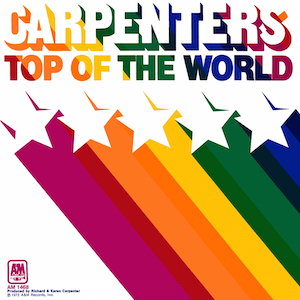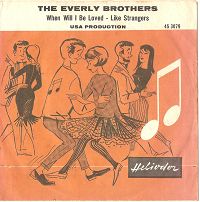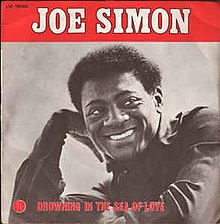
Joe Simon was an American soul and R&B musician. He began as a gospel artist singing with the Golden West Singers in the Bay Area in California. A consistent presence on the US charts between 1964 and 1981, Simon charted 51 U.S. Pop and R&B chart hits between 1964 and 1981, including eight times in the US top forty, thirty-eight times in the top 40 of the US R&B charts, and 13 chart hits in Canada. His biggest hits included three number one entries on the US Billboard R&B chart: "The Chokin' Kind" (1969), "Power of Love" (1972), and "Get Down, Get Down " (1975). In 2021, he was one of the 60 nominees for the National Rhythm & Blues Hall of Fame.

"Ooo Baby Baby" is a song written by Smokey Robinson and Pete Moore. It was a 1965 hit single by The Miracles for the Tamla (Motown) label.

"I Write the Songs" is a popular song written by Bruce Johnston in 1975 and released on his album Going Public in 1977. Barry Manilow's version reached number one on the Billboard Hot 100 chart in January 1976 after spending two weeks atop the Billboard adult contemporary chart in December 1975. It won a Grammy Award for Song of the Year and was nominated for Record of the Year in 1977. Billboard ranked it as the No. 13 song of 1976.

"You're Sixteen" is a song written by the Sherman Brothers. It was first performed by American rockabilly singer Johnny Burnette, whose version peaked at number eight on the US Billboard Hot 100 in December 1960 and number 3 in the UK in 1961. The song was covered by Ringo Starr in 1973 and this version reached number one in the US.

"Top of the World" is a 1972 song written and composed by Richard Carpenter and John Bettis and first recorded by American pop duo Carpenters. It was a Billboard Hot 100 No. 1 hit for the duo for two consecutive weeks in 1973.

"Until You Come Back to Me (That's What I'm Gonna Do)" is a song written by Morris Broadnax, Clarence Paul, and Stevie Wonder. The song was originally recorded by Stevie Wonder in 1967, but his version was not released as a single and did not appear on an album until 1977's anthology Looking Back. The best-known version of this song is the 1973 release by Aretha Franklin, who had a million-selling top 10 hit on Billboard charts. The song reached No. 1 on the R&B chart and No. 3 on the Hot 100 chart in 1974. It became an RIAA Gold record.

"Love Train" is a hit single by the O'Jays, written by Kenny Gamble and Leon Huff. Released in 1972, it reached No. 1 on both the R&B Singles and the Billboard Hot 100 in February and March 1973 respectively, and No. 9 on the UK Singles Chart and was certified gold by the RIAA. It was the O'Jays' first and only number one record on the US pop chart. The song has been considered one of the first songs of disco music.

"Don't Pull Your Love" is the debut single by Hamilton, Joe Frank & Reynolds which became a top ten hit single in 1971. The song was written by Brian Potter and Dennis Lambert.

"Loves Me Like a Rock" is a song by the American singer-songwriter Paul Simon. It was the second single from his third studio album, There Goes Rhymin' Simon (1973), released on Columbia Records. It features background vocals from the Dixie Hummingbirds, a Southern black gospel group. Although the lyrics are not typically associated with gospel music, the Dixie Hummingbirds were eager to record the song with Simon, and they recorded their own version soon after for their 1973 album We Love You Like a Rock/Every Day and Every Hour.

"You're the Best Thing That Ever Happened To Me" — also known simply as "Best Thing That Ever Happened To Me" — is a song written by Jim Weatherly, and produced by Don Law. It was first recorded in 1973 by Danny Thomas. Soon after it was done by Ray Price from his album You're the Best Thing That Ever Happened To Me. The song enjoyed two runs of popularity, each by an artist in a different genre.

"Clean Up Woman" is a song by Betty Wright from her second studio album, I Love the Way You Love (1972). Written and produced by Clarence Reid and Willie Clarke, it was released in November 1971 in the U.S. as a 7" single with "I'll Love You Forever" on the B-side. The song's distinctive guitar lick was played by Willie "Little Beaver" Hale.

"I Just Want to Be Your Everything" is a song recorded by Andy Gibb, initially released in April 1977 as the first single from his debut album Flowing Rivers. It reached number 1 on the Billboard Hot 100 for three weeks, starting on the week ending 30 July 1977, and again for the week ending 17 September 1977. It was Gibb's first single released in the United Kingdom and United States. His previous single, "Words and Music" was only released in Australia. It is ranked number 26 on Billboard's 55th anniversary All Time Top 100.

"Feel Like Makin' Love" is a song composed by singer-songwriter and producer Eugene McDaniels, and recorded originally by soul singer-songwriter Roberta Flack. The song has been covered by R&B and jazz artists including Gladys Knight & the Pips, Lou Rawls, Isaac Hays, George Benson, Jeffrey Osborne, Larry Coryell, Johnny Mathis, and Marlena Shaw.

"I'm Gonna Love You Just a Little More Baby" is a song written, produced and recorded by Barry White.

"When Will I Be Loved" is a popular song written by Phil Everly of the Everly Brothers, who had a US top-ten hit with it in 1960. Linda Ronstadt covered the song in 1975, and her version was an even bigger hit in the US, peaking at No. 2. Vince Gill also covered it in 1994 on the soundtrack of the film 8 Seconds.

"Love Won't Let Me Wait" is a hit 1975 single by Major Harris, a former member of R&B/soul group The Delfonics. Written by Vinnie Barrett and Bobby Eli, the single is considered to be a staple of classic soul playlists, and was Harris' only entry into the top five on both the soul and pop charts. The single hit number five on the pop chart, and also hit number one on the soul chart for one week. Billboard ranked it as the No. 24 song for 1975. It was awarded a gold disc by the R.I.A.A. on 25 June 1975.

"Too Late to Turn Back Now" is the 1972 follow-up single of Cornelius Brothers & Sister Rose to their debut hit "Treat Her Like a Lady". The single had previously been released in 1970 on the Platinum label.

"Do You Know What I Mean" is a song written and performed by Lee Michaels. It was produced by Michaels.

"How Sweet It Is (To Be Loved by You)" is a song recorded by American soul singer Marvin Gaye from his fifth studio album of the same name (1965). It was written in 1964 by the Motown songwriting team of Holland–Dozier–Holland, and produced by Brian Holland and Lamont Dozier. The song title was inspired by one of the actor and comedian Jackie Gleason's signature phrases, "How Sweet It Is!"

"Chick-A-Boom " is a song written by Janice Lee Gwin and Linda Martin and performed by Daddy Dewdrop. It was featured on his 1971 album, Daddy Dewdrop. The lyrics in the verses are spoken, rather than sung.




















